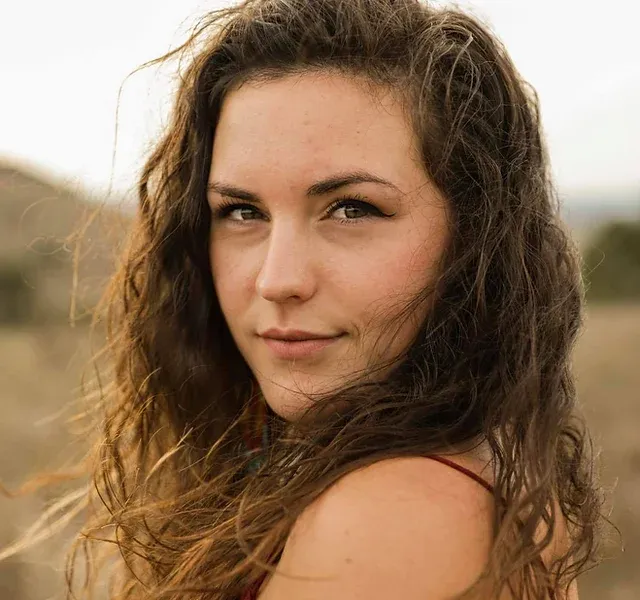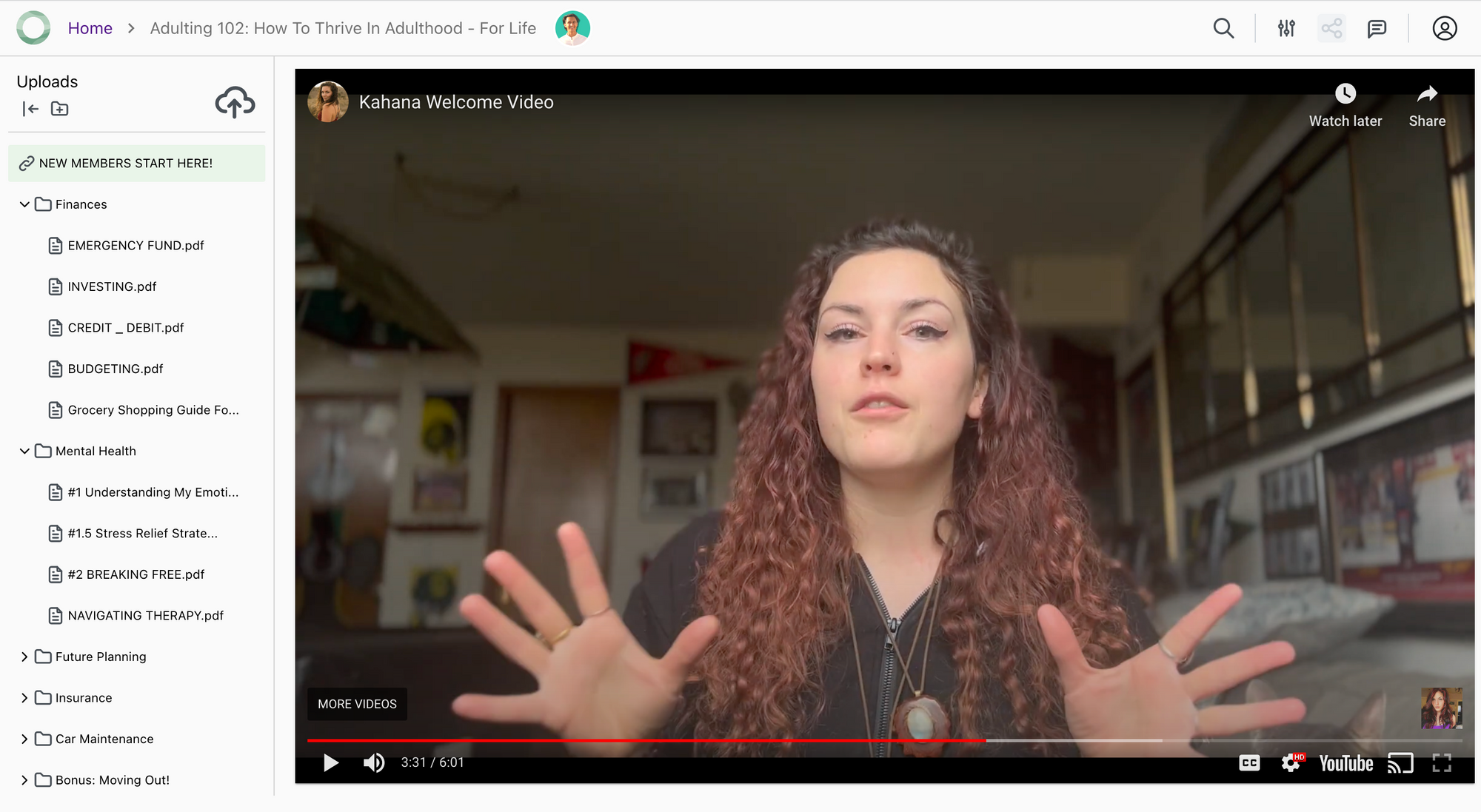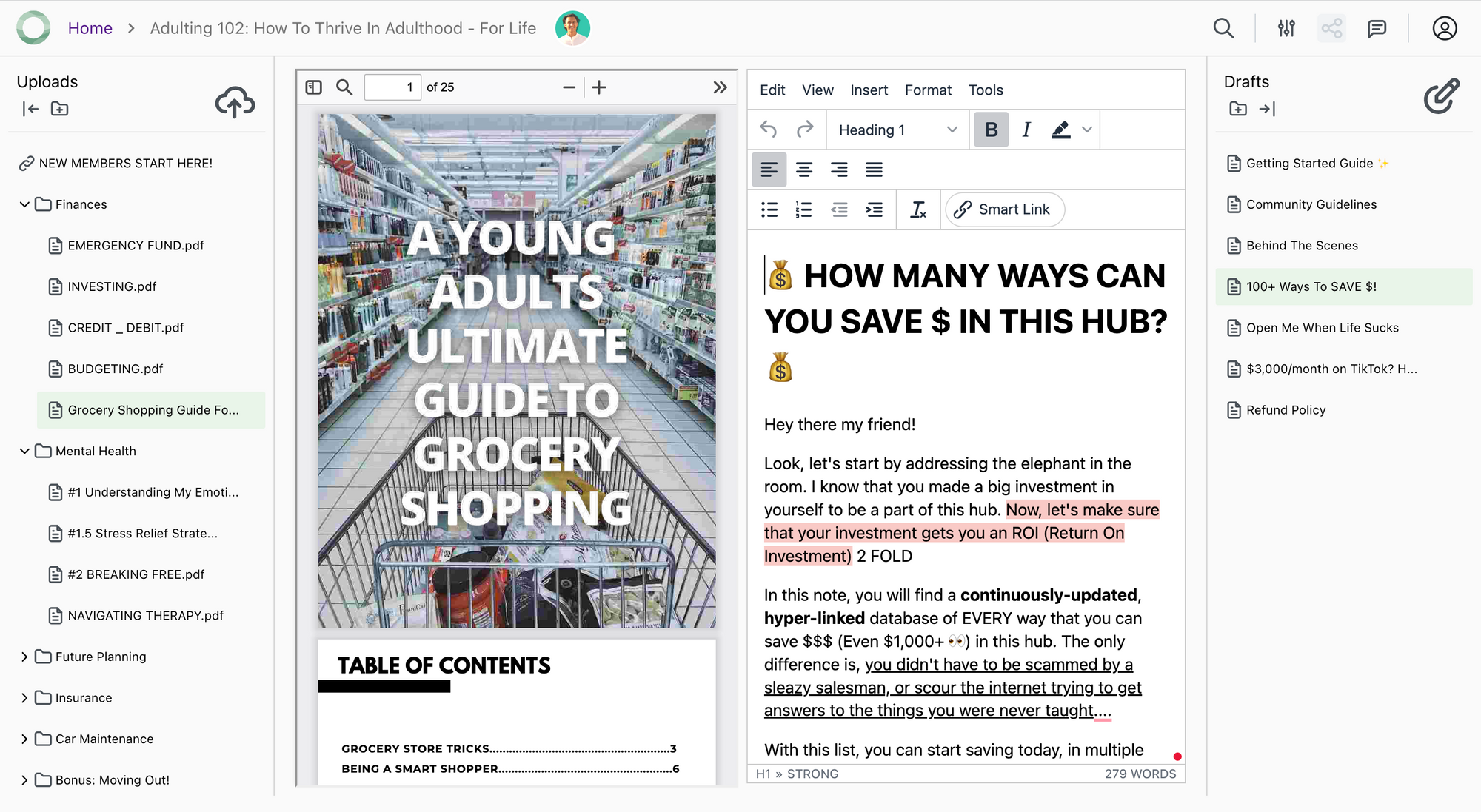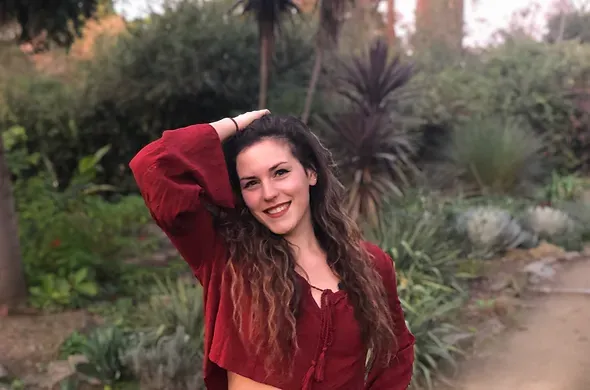Eden Gold on How to Thrive in Adulthood - For Life

DENALI: I went through your website and found it really interesting, especially since it aligns with my interests in a lot of ways. I have some standard questions that I would like to go through, as well as a few that branch off. Does that work for you?
EDEN: However you want to take this, let's do it. I'm an open book!
DENALI: After going through your website, I'm curious about how you decided to use content creation as the method to get your message across. Could you share your thought process behind that?
EDEN: Content creation requires you to pivot to where people are going, especially in my age group, which is primarily 18 to 24 but veering off a little earlier and later. I've found that TikTok and Instagram are where everyone is hanging out these days. Although I've never really gotten into Instagram, I use TikTok for branding and have found it to be really successful in reaching people in this age group.
As a motivational speaker for high schools and colleges, reaching administrators and higher-ups takes a lot of different work that isn't necessarily content creation. However, in terms of getting my message out and building my brand, content creation is essential.
DENALI: Following up on that, do you currently view content creation as a way to generate income or are you still building your brand? How do you see that transition taking place, or did it already happen for you?
EDEN: Although I've been in business for four to five years, I've only been profitable for just over a year. So, my brand is physically being built, and things are really on the incline for me right now. It's been awesome to see this thing take off. To answer your question, I view content creation as a business opportunity and a way to make money.
If you look at my TikTok, you'll notice that I don't post a lot of personal stuff. Not that I don't want to, but I simply want to build a business. Other than that, I don't want to be on social media very much. That's just me. Don't get me wrong, I spend time scrolling and I love seeing other creators make me laugh and take their businesses to the top. However, I express myself in ways in my personal life and with the people I love, and I use social media as an income source.
DENALI: That makes sense. Moving on to writing, are you planning on creating more long-form content? How do you plan to use Kahana?
EDEN: I just wanted to add something quickly to what I said before about content creation and monetization. While it's great to monetize the things I speak about, my ultimate goal is to make an impact and change the lives of 1 billion teens and young adults. So it's not just about the money. I wouldn't continue doing this if I didn't see the changes in my audience's lives.
As for Kahana, I've had many startups and software companies reach out to me in the past, but there was something about the platform as a whole that really intrigued me. I see Kahana as 'OnlyFans for Education' since people pay for access to all the content I've created over the years, my journey, where I'm going, and behind-the-scenes work.
By allowing my audience to follow along with me, I believe we can make a greater impact and build stronger connections.
DENALI: 100% - I couldn't agree more. I think a good follow-up question would be, what are your plans for content on Kahana? Do you have any previous project notes that you think would fit well on the platform? I'm curious to hear your thoughts on that.
EDEN: The founders of Kahana and I have been bouncing off so many ideas. Even though the platform is still being built, I can see its potential. To get started, I created a video welcoming users to my page and showcasing what they can expect to see.

I also included my adulting bundle series, which covers personal finance, credit, investing, mental health, stress, and more.
I plan on uploading more pre-made content for my audience to use. In addition, I'm creating tabs for weekly updates, community chats, and tips and tricks related to mental health, trends, and more. These updates will be released weekly to keep my audience coming back for more.
So the moment they enter my Adulting 102 Hub, they can access all of that and have it to themselves. The value proposition of giving them that is that they have invested in themselves to get in here, and let me show them all the ways that being in here can save them money in the long run.

One of the initial things I start with is saying that the average American alone wastes $18,000 per year on impulsive buying, on the sleazy car salesman guy telling them what they need to buy in terms of insurance or a new car, and so many other things that we don't know we're getting scammed on.
By making this investment in themselves, I want them to have so much value, so much content that can save them money and help them make better decisions, so in the long run, they can almost immediately get that $18,000 back.

Adulting 102: How To Thrive In Adulthood - For Life
Welcome to Eden Gold's Adulting 102 Hub, where you'll learn how to bridge the gap between what you were taught in school and what you actually need to be successful in adult life. Spend 15 minutes per day gaining skills with this hub and you can save $5,000 per year. I stand by the quality of my products and am confident that you will be satisfied with your purchase. If for any reason, you are not happy with my product, you may request a 100% refund.
DENALI: That's awesome. On a different track, one thing we want to bring up when we're telling creators' stories is the idea that it's not always easy. Kind of like you were saying, you don't just get right to the top. So, to drive that home, we like to ask, you know, what was your biggest struggle? When you were starting your own brand and your own content creation, what was the biggest hurdle you had to overcome?
EDEN: The biggest struggle by far for me was imposter syndrome, feeling like I'm not good enough, feeling like I'm never going to be where other people are, so why even start?
And my brand is still really tiny, and in the grand scheme of things, I could have a 1,000,000 and 2 reasons why I could compare myself to other content creators. But I have learned now to stay in my own lane.
So the biggest struggle for me was not feeling good enough, and I know it sounds cliché, like something we hear everybody say, but that's because it's so common. And that's why it's important for me, with my specific brand, to break barriers on what young adults think they should do and just be vulnerable and teach them how to be confident and make smart decisions and believe in themselves.
Just be vulnerable, all the vulnerabilities. So the more that I can do that in my content and share that, the more that I can relate to them, and I overcome some of my insecurities and fears, and they can too along the way.
And in terms of something that really helped me view my business as something that can and is becoming successful is that we look at successful people here on the top of the mountain, and we're all here on the bottom, and all we want is to build this business and impact lives and create financial freedom and stability for ourselves.
But the greatest thing I ever heard was the top of this mountain, it's not a point, it's flat. There's room for everyone. There's never going to be too much success where people can achieve success. We have more millionaires today than we've ever had before. So the top of the mountain is not a point, it's flat, and there's room for everybody up there. So it's only a battle between yourself, and that helped me a lot.
DENALI: That's awesome, and that's really good advice too. I have a follow-up question if you don't mind. Do you have any additional strategies or thought processes for dealing with the day-to-day grind of building an audience, maintaining creativity, and managing your time? It can be tough when you're working for yourself, as opposed to having a list of tasks to complete each day like you would with a traditional job.
EDEN: We all learn differently and need to find hacks that work for us. For me, I'm notorious for pressing snooze 5 times a day because I feel overwhelmed when I look at my day and don't know where to start. So, I make a list of everything I need to do the night before, even down to what I'm going to have for breakfast. The simpler we make things, the less decision-making we have to do, and the more successful we can be.
Consistency is the hardest part about growing an audience, but I find hacks like using a free online headline generator to generate catchy titles and topics for my videos help me stay consistent. I also use the Pomodoro study method to keep me focused on my work and prevent burnout. This method involves working for 25 minutes followed by a 5-minute break. Even if you feel like you can work longer, this method increases productivity and feels like a little game you can play with yourself. Check it out - Pomodoro study method!
DENALI: Decision fatigue can be a real obstacle.
EDEN: Decision fatigue! That's the word!
When I talk to people, like my clients for example, and they say, 'My goal is this, this, this, this, and this', and I hear all these goals they want to achieve in a short period of time.
I pretty much have to tell them, 'That's great, but the reason we're here today is that you've been trying to reach goals A through K on your own and you haven't been able to do it. It's too overwhelming. But you're still in that same pattern of feeling like you can do a ton all at the same time.' So, granted, I believe that you can.
Let's start with one decision, like let's start with one push-up. Oh, you can do one? Great. If you do more, that's just extra credit. But we're just gonna start with the first thing so that we can have that little dopamine rush and our brain is telling us, 'Oh my gosh, I can achieve something. I'm not a total failure.' And then we can just go on to achieve more and more and more. Start with the first decision.
DENALI: I really like that. Now, to switch gears a bit, are you currently working on any new projects or courses that you're particularly excited about?
EDEN: I have an online program called Life After High School, with the slogan "a mentor in your back pocket". The goal is to bridge the gap between what we're taught in school and what we actually need to be successful in adult life.

Life after High School
Life After High School is a dynamic life-improvement program for teens and young adults. Our mission is to help them set a true foundation for success in their 20's by bridging the gap between what we are taught in schools, and what we actually need to be successful. Tackling topics such as personal development, finances, mental health, and more, this is an all-inclusive program that aims to support young adults in whatever phase of life they are in. With us, you will always have a mentor in your back pocket.
Life After High School covers personal development, such as the science behind goal-setting and achieving, building self-confidence, and keeping the promises you make to yourself.
It also covers morning and night routines, how to craft one that works for you, finding a mentor, resources, and accountability.
We even have a LinkedIn expert who teaches you how to job hunt effectively and use SEO in LinkedIn to improve your resume. The resource also delves into finance, including creating a budget and helping you set up a path to early retirement and financial independence.
It also covers mental health topics like medications, anxiety, trauma, eating disorders, social media's impact, and physical health, including nutrition and fitness.
Finally, it also covers relationships and life skills, such as how to navigate toxic relationships, how to rebuild relationships with your family, self-defense, moving checklists, moving out for the first time, and more.
It is a comprehensive program to get started with adulting and answer the questions that may frustrate you because no one taught you.
I'm also working on a one-on-one coaching program, called Young and Successful, which already has some enrolled clients. It's a 16-week coaching program that takes people with a goal and a dream and helps them live it out through one-on-one coaching. Clients also learn about the science behind goal setting and achieving and other relevant lessons.
DENALI: That's awesome. My last question is about the field of mental health and goal setting. Many people struggle to set themselves apart in this dense field. How did you find the best way to differentiate yourself and be unique?
EDEN: Oh my gosh, I know it's easier said than done to not care about what other people are doing.
If you have room to compare yourself to others or envy them, then you need to get busy. You're spending too much time scrolling. Unfollow every single person that you follow. They'll be fine without your follow.
You don't need to follow them because you love this influencer, and they have the nicest bikinis. You just feel bad about yourself when you look at them.
Take a good look at yourself in the mirror and be honest. I would say to do a social media cleanse and unfollow everyone. It doesn't have to be permanently, just temporarily, so that you don't focus on what other people are doing.
Cancel out the outside noise and keep yourself in your little box. It also helps to have a plan. A lot of people get stuck in this comparison game because they're not seeing the struggle that people go through. They see the outcome.
Another reason why I like the Hub is that people see success stories without seeing the decade of work that people put in beforehand to achieve their goals. We need to acknowledge the effort and hard work that people put in to achieve their success.
You need to stay in your lane. I had to learn that and more. Also, with the same importance, I needed to have a game plan.
People who compare themselves to others don't really know what to do or what steps to take, so they say, 'I'm confused. I don't wake up excited because there's a huge learning curve. Oh, I'm scared.' Get a mentor, get a coach, follow people who genuinely inspire you, and get to work. That's all you have to do.
DENALI: I love that... I covered the majority of topics I wanted to discuss, and you gave great answers. Is there anything else you'd like me to focus on or mention?
EDEN: I just want everyone to know that failure is an essential part of success. When we fail, we learn what doesn't work, which brings us one step closer to our goal.
The best advice I can give is to surround yourself with like-minded people, find a mentor or coach who inspires you and feed your brain with positivity and motivation every morning. Don't wait for tomorrow to be happy, start today.
One of my mentors, Ed Mila, taught me to ask myself why I want to achieve my goals and what feelings I believe will come with achieving them.
Often, it's not the goal itself that we're after, but the feelings associated with it. By learning to feel those feelings today, we can hack our emotions and brains to make achieving our goals faster and easier.
Find those little opportunities for accomplishment and fulfillment in your journey, and you'll keep going even if you experience setbacks.
